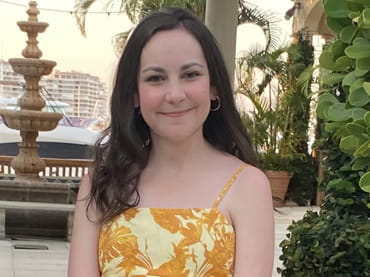Natalie Wasserman Kingston, 33, of St. Louis, appreciates the simple pleasures life has to offer – having a conversation, cooking, or getting a full night’s sleep.
“The simple pleasures are just so incredible – the act of just taking a walk without getting winded or walking to go get something out of the refrigerator or reading a book,” Natalie says.
For more than 15 years, these activities were incredibly challenging for Natalie, who suffers from cystic fibrosis (CF). CF is an incurable disease that causes the airways to be dehydrated because of inherited mutations in the cystic fibrosis transmembrane regulator (CFTR) gene.
When Natalie’s condition rapidly deteriorated in January 2021, her only hope was a lung transplant. She was referred to Pittsburgh to receive a double lung transplant at the UPMC Lung Transplant Program.
The Condition: Cystic Fibrosis
Natalie was diagnosed with CF shortly after she was born. The condition causes the lungs, digestive system, and other areas of the body to get clogged with a thick, sticky mucus.
There are five classes of mutations to the CFTR gene. Natalie has nonsense mutations, which make her ineligible for the newest, transformative CF treatment options.
People with CF are more prone to infections like bronchitis and pneumonia due to bacteria becoming trapped in the clogged mucus. A variety of different types of bacteria can infect the airways of individuals with CF. Natalie’s lungs were infected with Burkholderia gladioli. Like the mutation she suffers from, this bacteria is rare and increases the risk of transplant complications.
Natalie’s condition remained stable throughout much of her childhood. But CF progresses over time – as she grew older, she was tethered to oxygen and required very frequent courses of intravenous (IV) Antibiotics.
Natalie’s condition was medically managed throughout her early adulthood as a full-time schoolteacher. Up until January 2021 – when her condition began to rapidly decline and she required supplemental oxygen – she had never considered a lung transplant.
Her CF doctor knew that UPMC had experience with unusual CF infections, and referred Natalie to UPMC where the Lung Transplant Program offered her hope.
Finding Hope: The Road to the UPMC Lung Transplant Program
As Natalie’s condition deteriorated in the early months of 2021, her care team in St. Louis referred her to UPMC. The team explained that UPMC is home to one of the most experienced lung transplant centers in the country and will often accept high-risk transplant candidates.
Natalie was hopeful yet scared – she had been declined for transplant by several other transplant centers across the country. Even if UPMC accepted her case, that would still mean moving to a different state in the middle of the COVID-19 pandemic, all compounded by her condition continuing to decline.
When she arrived in Pittsburgh with her family, she was very sick and immediately came under the care of UPMC’s comprehensive CF and lung transplant teams.
Back to Enjoying the Simple Pleasures
UPMC experts cared for Natalie for two weeks in the hospital after she arrived in Pittsburgh, and after an evaluation she was added to the waiting list for a lung transplant in June 2021.
“That’s the day that I really felt like, ‘Oh my God, I might be able to live,’” Natalie says.
About a month later, she received the call that a suitable donor had become available for her. Her double lung transplant took place in July 2021 and took eight and a half hours.
After the surgery, Natalie’s initial recovery was trouble-free and unusually quick, which she gratefully describes as “miraculous.” She only spent four days in the intensive care unit (ICU), less than half of the median time spent in the ICU for double lung transplant patients, and she was discharged from the hospital just over two weeks later.
She considers her care team at UPMC her heroes.
“The time that I spent in the hospital at UPMC, and the staff, the nurses, the doctors; everybody was so amazing,” Natalie says. “Being out-of-state in a new place and getting medical care under extreme conditions – it was the most incredible team of people in medicine that I have ever experienced. That gave me so much relief and optimism that I was in the right place.”
Following her treatment at UPMC, with her family by her side every step of the way, Natalie is back to enjoying the simple pleasures life has to offer.
“Although I still have some limitations because of COVID-19, and I’ve been extremely careful for that reason, there’s still a million-and-one things that everyday I’m like ‘wow,’ this is so nice,” Natalie says. “This is how I felt as a kid growing up.”
Natalie’s treatment and results may not be representative of similar cases.

















